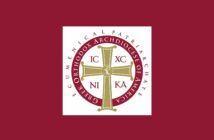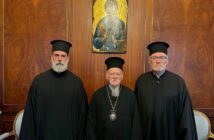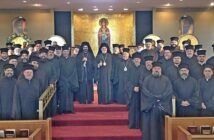
George D Karcazes
Originally posted on December 31, 2021
The process for gathering input from the clergy and laity outlined by the Greek Orthodox Archdiocese of America (GOA), was to ask the 80 or so members of the Charter Committee to submit questions to be collected, organized, and incorporated into a questionnaire to be submitted back to the committee. The committee’s responses to the questionnaire would then be “summarized” by the Archdiocese to guide the members of the “drafting committee” appointed by the Archbishop. Those appointees will presumably meet with the 5 or so members of the drafting committee appointed by the Patriarch. This Archdiocesan/Patriarchal committee will then presumably draft the new charter.
The Archbishop appointed the initial members of the Charter Committee. They are mostly Archons, FAITH, Leadership 100 (L100) and/or members of the Archdiocesan Council. It also includes Argo Georgandis-Pyle, the immediate past-president of OCL, who was appointed by the Archbishop, as well as four appointed by each Metropolitan. I was one of those added by the Metropolitan of Chicago.
I submitted the questions below. There has been only one [Zoom] meeting of the committee. We were told at that meeting that the questionnaire would be sent to us in October. I have not received it yet. As convoluted as the process was to begin with, ignoring it heightens the cynicism with which the faithful view the whole process.
George D. Karcazes
OCL Secretary
QUESTIONS REGARDING GREEK ORTHODOX ARCHDIOCESE CHARTER
- Why did the Ecumenical Patriarch/Patriarchate suspend the Charter of the Archdiocese?
[Because the lay members of the Church are bewildered by this action, shouldn’t the Report of Archbishop Elpidophoros to the Ecumenical Patriarchate referred to in the October 12, 2020 Press Release of the Patriarchate which announced the suspension of the Charter, the removal of Metropolitan Evangelos of New Jersey and the temporary suspension of Metropolitan Methodius of Boston, be published?]
- Do the Hierarchs of the Greek Orthodox Archdiocese of America (GOAA) have actual Episcopal authority in the territories entrusted to them if they can be removed at any time and for any, or no, reason by the Patriarch/Patriarchate?
- Shouldn’t the Charter of the Greek Orthodox Archdiocese of America re-establish the Archdiocese as an Autonomous Archdiocese under the Ecumenical Patriarchate of Constantinople? [Autonomous Archdiocese means (1) the unrestricted right to elect its own bishops, and present the Mother Church three (3) nominees for primate, one of which must be elected by the Mother Church; and (2) the unrestricted right to administer the Archdiocese, limited only by consultation with the Mother Church on issues of “doctrine, liturgy, sacraments, relations with autocephalous Orthodox Churches and ecumenical policy with respect to other Christian and non-Christian bodies.”].
- Do you agree that all Hierarchs of the Archdiocese, including the archbishop, be U.S. Citizens who reside in, and have served at least five (5) years ministering to the faithful in the U.S., without exception? [Note: The current Charter provides that the archbishop shall “have had a period of successful service in the Archdiocese of no less than five (5) years, or to have proven, direct, substantive and broad knowledge of the life and status of the Church in America” … and are eligible, “regardless of the place of residence or service during the time of election.”] Wouldn’t this ensure more responsive and responsible leadership?
- Should not the Archdiocesan Council review the proposed Charter and have the right to amend it before it is submitted to the Ecumenical Patriarchate/Holy Synod for ratification? Clearly, this is in keeping with meaningful lay participation in the Church.
- Doesn’t meaningful lay participation in Church governance require that the Clergy-LaityCongress also have the right to approve, reject or amend the Charter before it is implemented?
- Should the Charter provide that the principal liturgical language of the GOA parishes in America must be English [except, with the permission of the local Hierarch, in those parishes where the majority of the faithful only speak and understand Russian, Serbian, Greek, Spanish, Romanian, Inuit, Aleut or another Indigenous People’s language?
- Should the Charter empower the GOA Hierarch members of the American Assembly of Bishops to join with a majority of the other Bishops of the Assembly to constitute themselves as a Synod, elect their own Primate, and request recognition by the other Autocephalous Churches as the Autocephalous Orthodox Church of America? Is this not the inevitable future of Orthodoxy in America?
- Do you agree that the Charter should specifically acknowledge the role of the clergy and laityinAmericabyprovidingthat nodecisionsconcerningtheChurchinAmericacan be made unilaterally either by the Ecumenical Patriarchate or the Clergy-LaityCongress, all decisions requiring the approval by both? Isn’t this consistent with Orthodox ecclesiology that “the first should do nothing without the others, and the others do nothing without the first”?
- Should the Charter of the GOA specifically provide that the local Synod should authorize the establishment of a permanent* Diaconate, including restoring the female Diaconate? [* not as a path to ordination to the Priesthood]
- Do you agree that the Greek Orthodox Archdiocese of America should be a missionary church seeking to re-evangelize its own adherents who have left the Church and to bring Orthodoxy to those in America who are seeking the truths of Orthodoxy rather than being the conservator of the modern Greek language and culture in America?
- Considering the US Constitution’s 1st Amendment separation of Church and State, shouldn’t the GOA refrain from lobbying the US Government on behalf of the Hellenic Republic [Greece] and the Republic of Cyprus? If you believe the Archdiocese should engage in these activities, please provide the justification under American law and traditions.
- The Charter defines the relationship between the Ecumenical Patriarchate and the Archdiocese. Should the Ecumenical Patriarchate have the unilateral power to revoke/suspend/amend the Charter without the consent of the Archdiocese?
- The Charter defines the relationship between the Ecumenical Patriarchate and the Eparchial Synod of the Archdiocese. Should the Ecumenical Patriarchate have the unilateral right toappointtheHierarchsoftheArchdiocesewithouttheconsentoftheArchdiocesan Council/Clergy-Laity Congress?
- Should the Ecumenical Patriarchate have the unilateral right to remove Hierarchs of the Archdiocese without the Hierarch being informed of the cause and the right to respond/defend himself?
- Should ecclesiastical courts convened to judge any charges involving laity, clergy and/or hierarchs include independent lay theologians as well as clergy and hierarchs and include procedural due process procedures including the right to know the charges; the right to representation; the right to confront and cross-examine witnesses; the right to have a record of the proceedings kept; and the right to appeal?
- Until the overlapping Orthodox “ethnic jurisdictions” in North America are united as a local Autocephalous Church, should the Charter of the GOA allow parishes (including clergy and property) to transfer to either the OCA, Antiochian Archdiocese or other canonical Churches in America where the liturgical language is English, in order to retain and attract the faithful who do not understand foreign languages used in their parishes?
- Should the Charter define the role of the Archbishop as the Ethnarch (i.e., the political leader of a common ethnic group) of the omogenia (i.e., people of the same race), in America?
- Should the Charter empower the Hierarchs in America to address the issue of Fundamentalism and the Ephraim cult teachings infecting parishes and require enforcement of the Archdiocese Monastery Regulations promulgated by the Patriarchate?
- The current and recent Charters of the Archdiocese have emphasized the need for the Archbishop to have served in America for at least five years or to have “direct, substantive and broad knowledge of the life and status of the Church in America.” This knowledge reflects the need for Orthodox Church leaders in America to understand the American ethos of democratic participation and insistence on the Rule of Law and due Americans do not respond to leaders who “issue commands and enforce them by the rope and the stake, the concentration camp and the gulag.” [Arthur MSchlesinger, Jr., “On Leadership”], Should the Charter of the Archdiocese enshrine the American ethos of democratic participation, adherence to the rule of law and due process?
- Should the Charter provide that an elected layperson should be the co-presiding officer of the Clergy-Laity Congress to handle administrative/legal matters and a Priest be elected as the co-presiding officer of the Congress to address canonical/spiritual agenda items?
- Should the members of the Archdiocesan Council, Executive Committee of the Archdiocesan Council and Metropolis Councils be elected by the clergy and laity, rather than be appointed?
- Should the Charter require that independent auditors conduct annual audits of parish, Metropolis and Archdiocesan finances, and if irregularities are identified, forensic audits be conducted to identify and address responsibility?
HISTORY REPEATS: CHARTER CRISIS IN THE GOA – OCL OPEN FORUM IN CHICAGO – 2004




3 Comments
Fat chance of any of these happening. Why I’m in OCA.
Jim,
Absolutely! I agree with you. The GOA is too big of a “fat cow’ to let it go on its own.
Fortunately, we live in a country that affords us many, many religious options and our young people are taking advantage of them.
“It is what it is” and you have, at least, understood this with your choice of the OCA.
Of course, the GOA is a cash cow for the Patriarchate of Constantinople, which will continue to keep it on a very short leash, as demonstrated by the fact that it dispatched one of its hierarchs (a Turkish citizen) to maintain the reins. Nor does it care one bit that the GOA has for some time been reduced to a spiritually bankrupt Greek social club at prayer.